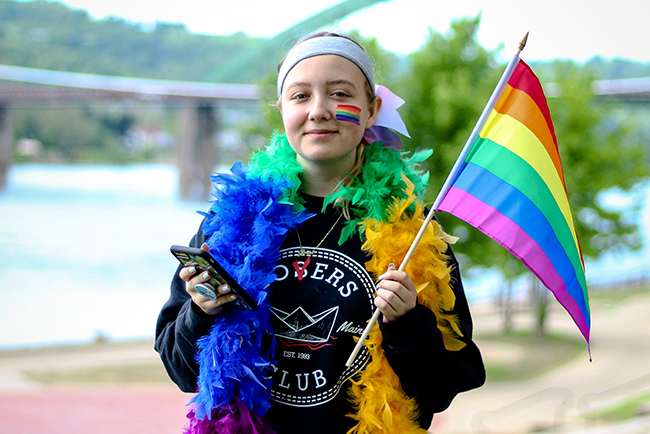
By Aaron Earls
Few American adults identify as lesbian, gay, bisexual or transgender, but the numbers are much higher among younger generations. Almost every Christian student will have an LGBTQ friend or classmate, so church leaders must speak on issues of sexuality with truth and love.
According to Gallup, only 5.6% of U.S. adults identify as LGBTQ—far below the 23.6% the average American estimates. Click To TweetThe latest Gallup survey found only 5.6% of the population identify as LGBTQ, up slightly from 4.5% in 2017. Specifically, 0.7% say they are lesbian, 1.4% gay, 3.1% bisexual, 0.6% transgender, and 0.2% other. The almost 6% total number is still far below the 23.6% an average American estimates the LGBTQ portion of the U.S. to be.
“While small in percentage, the LGBTQ community is loud in terms of voice,” says Ben Trueblood, director of student ministry at Lifeway. “With middle and high school age kids in my own home, I know it is a topic seen and discussed within Gen Z.” And the younger generation is where the highest percentage identify as LGBTQ.
Generation LGBTQ-Z?
Among Generation Z, however, 15.9% say they are something other than heterosexual, significantly higher than other generations—millennials (9.1%), Generation X (3.8%), baby boomers (2.0%), and traditionalists (1.3%).
15.9% of Gen Z identifies as LGBTQ— significantly higher than millennials (9.1%), Generation X (3.8%), baby boomers (2.0%), and traditionalists (1.3%). Click To TweetSean McDowell, author of “Chasing Love,” says he’s not surprised by the percentage of Gen Z identifying as LGBT. “Young people today have grown up with a nearly ubiquitous exposure to LGBTQ narrative about identity and relationships in schools, the media, social media, Netflix, and many other avenues,” he says. “It’s also personal to them because virtually every young Christian today knows someone who identifies as LGBTQ.”
Other research also indicates many of those individuals not only identify as LGBTQ but also as Christian. One survey found 41% say they’re Christian—23% Protestant and 18% Catholic.
“Young Christians today are far more influenced by cultural ideas about identity and sex than many pastors realize,” says McDowell. “Don’t assume kids know what the Bible teaches about sex and identity or why it says it. Most Christian students have little depth in regard to their theology of sexuality.”
For Trueblood, this means “leaders need to be educated on the topic both from a biblical and cultural perspective so they can help students navigate these issues.” Part of that comes from “creating environments where these issues are discussed openly and without awkwardness in the church.”
We certainly need to speak biblical truth but work hard to create a place where kids feel heard, understood, and loved. — @Sean_McDowell Click To TweetMcDowell agrees. “We certainly need to speak biblical truth but work hard to create a place where kids feel heard, understood, and loved.”
Teaching truth in love
As student pastors navigate how to help their students grasp what Scripture says about the topic, Trueblood says they must communicate both what the Bible says specifically about sexuality but also what it says generally about salvation. “Students need to know what the Bible says on this issue while also understanding the Bible’s clear teaching that Jesus didn’t come to condemn the world but to save it. Yes, we must speak the truth and stand on the truth, but our condemnation of a lost person’s lifestyle doesn’t do anything to bring them closer to Christ,” he says.
Loving, listening, and building relationships with people that reveal Jesus through our actions and worlds build the foundation for us to speak the truth of the gospel with another person. — @BenTrueblood Click To Tweet“Loving, listening, and building relationships with people that reveal Jesus through our actions and worlds build the foundation for us to speak the truth of the gospel with another person,” Trueblood says. “The same is true for our students as we seek to teach them how to navigate these issues biblically while also fulfilling the Great Commission.”
McDowell notes that helping Christian students embrace biblical teaching will take time and commitment to “strip away faulty secular ideas and replace them with biblical truth.” He says, “I just spent eight weeks with my high school students teaching through the nature of love, freedom, identity, and forgiveness before we even got to issues of sexuality. Then we dove into what Scripture teaches about God’s design for sex, singleness, and marriage. And then we addressed issues such as the LGBTQ conversation.”
As they approach these subjects, McDowell says churches need “a more balanced approach that unpacks how to love other people with both body and soul. Many Christians are deeply confused over what it means to be an embodied person who is both body and soul. We tend to focus on the soul at the expense of the body. Nancy Pearcey did a great job of bringing this balance in her book ‘Love Thy Body.’”
Both McDowell and Trueblood stressed the importance of churches being intentional about discussing matters of sexuality and gender with students. “It is so important to create an environment for open, comfortable conversations around these issues,” Trueblood says.
Students are hungry for real conversations. Please be willing to talk with them and take their questions seriously. If we don’t, our culture will fill the void. — @Sean_McDowell Click To Tweet“Students are hungry for real conversations,” says McDowell. “Please be willing to talk with them and take their questions seriously. If we don’t, our culture will fill the void.”









